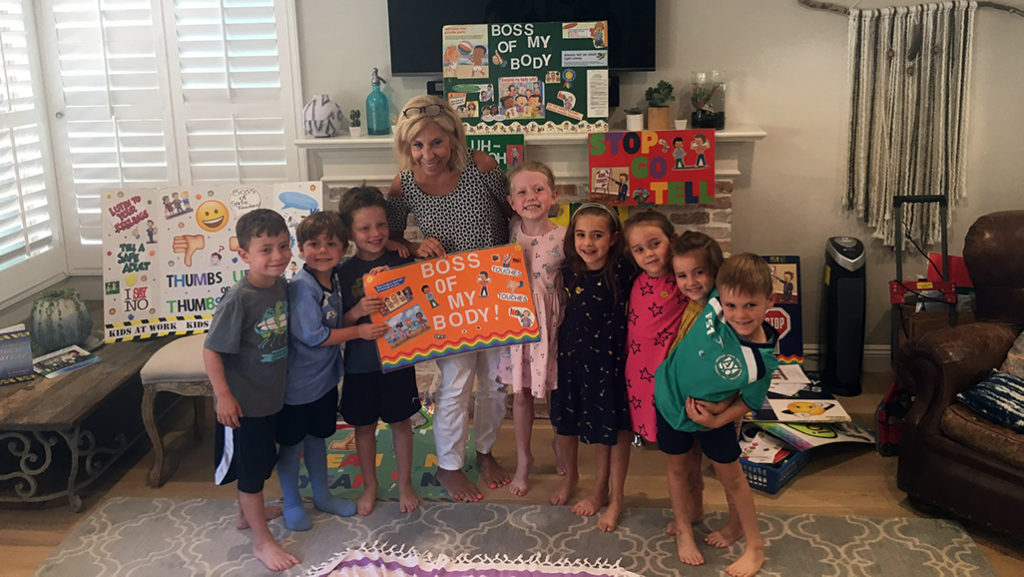Prevention

FACTS
…90% of all childhood sexual abuse occurs by someone with whom the child knows and has a trusted, established relationship, not by a stranger.
…According to the National Center for Missing and Exploited Children, statistics show that 1 in 5 girls and 1 in 10 boys are sexually exploited before they reach adulthood, yet less than 35% of those assaults are reported to the authorities.
…Childhood sexual abuse occurs among ALL socioeconomic, educational, racial, and cultural groups in the United States and in the world.
…Sex offenders do not usually look “weird”. There is no outward physical appearance to indicate an abuser, and they are experts at hiding their true selves. Sex offenders look “normal”. It’s part of the “con”.
…The most vulnerable age for sexual abuse is between 9 and 12 years old. The National Center for Missing and Exploited Children reports that 84% of sexually abused children are victimized before the age of 12.
…In the majority of cases of childhood sexual abuse, most predators gain access to their victims through “grooming”, with enticement, secrecy, and deception, seldom by using force.
…60% of child sexual abuse victims never tell anyone.
…As many as 40% of children who are sexually abused are abused by older or more powerful children.
…Only 4 to 8% of child sexual abuse reports are fabricated. Most of the fabricated reports are made by adults involved in custody disputes.
…Sex offenders pose one of the highest risks for re-offending after being released from custody.
![]()

PREVENTION TIPS
Pay Attention to who’s paying attention to your Kid!
1. Pay attention to anyone who continually insists on one-on-one access to your child, which does not include you, particularly if it involves helpful favors or special treatment. Ask yourself: “Does this make sense?”
2. Put out a “visible vibe” that you are an engaged parent. Child abusers often ‘select’ their target by watching a family’s dynamic or parenting style.
3. Replace the word “stranger” with “tricky person”: It’s not what someone looks like, it’s what they say or want to do with a child that makes them unsafe or “tricky”.
4. A tricky person can be someone you know well, don’t know at all, or know just a little bit. Anyone who tries to get a child to break their safety rules or hurt their body is not okay.
5. Listen to your child. If they don’t want to be around a particular person, such as a babysitter, relative, or family friend, don’t force them. They may be getting a “red flag” signal that you are unaware of.
6. Be mindful of settings where older children have a lot of privacy with younger children. Keep doors open, especially during playdates.
7. Practice personal safety strategies with your kids: what would they do if they were lost in a store? What would they say if someone asked them for directions or assistance?
8. Do not write your child’s name on the outside of any personal belongings such as a backpack or jacket.
9. Say something if you are clearly uncomfortable about someone’s actions or behavior. Even a statement such as “I’m just not comfortable with that…” can be enough to warn a potential abuser that you are paying attention to them.
10. The “Uh-Oh feeling”: trust your instincts and let your child know it’s okay for them to trust theirs.
11. Establish a straightforward family rule: No secrets allowed, especially if it involves “Private parts” or “Uh-Oh” touches. It’s always okay to tell!
12. Let children decide for themselves how they want to express affection. Do not force them to hug or kiss another person.
13. Spend time with your kids. Children who are starved for attention can be especially vulnerable to a predator’s tricks.
14. Volunteer at your child’s school or other activities. Know who the people are who are interacting with your children.
15. Develop strong communication skills with your child so that they will feel safe coming to you if something is bothering them.
16. Teach safety concepts in a loving, easy-going manner. Scare tactics can make a child fearful and are not necessary.
![]()

RED FLAGS & WARNING SIGNS
A sex offender continually seeks ACCESS AND PRIVACY with their intended target as part of their manipulation and grooming process. In addition, there are often other red flag warning signs and behaviors to indicate that someone may not be a safe choice around your child. Use common sense, monitor certain relationships that others have with your child, particularly if there are indicators that give YOU an “Uh-Oh Feeling” or just don’t seem right. Best advice for parents:
PAY ATTENTION TO WHO IS PAYING ATTENTION TO YOUR KID!
Possible Red Flags include:
- Someone who continually tries to arrange time alone with a child, often with lots of reasons or excuses which exclude you
- Someone who repeatedly befriends one “outstanding” child, singling them out, lavishing them with extra attention, praise, gifts, affection
- Someone frequently offering favors to “help you out”; i.e. babysitting for free, transporting a child to activities, free lessons, or taking kids on overnight trips without their parents
- Someone who uses guilt tactics when the child or parent insists on setting boundaries or limits
- Someone who insists on being physical with a child (hugging, kissing, tickling, wrestling, lapsitting), even when the child does not want this physical attention
- Someone who makes inappropriate comments about a child’s looks or body, particularly sexualizing a child
- Someone who continually invites children to spend time alone at their home, enticing them with the latest video or computer games, toys, gadgets, etc. – especially an adult who does not have children of their own
- Someone who repeatedly ignores social, emotional, or physical boundaries or limits and seems to have no boundaries of their own
- Someone who frequently enters a bathroom or locker room where children are changing or showering and does not respect a child’s need for privacy
- Someone who prefers to spend most of their free time with children and seems to have no interest in age-appropriate relationships or friendships
- Someone who appears especially preoccupied with one child
- Someone who seems “just too good to be true”
- Someone who insists on closed doors and an unobservable environment whenever they are with your child
- Someone who seeks to isolate the child from others
- Someone who treats a child as if he or she were older
- Someone who offers expensive gifts or money to a child for no reason
- Someone who undermines a parent’s authority by allowing children (especially pre-teens) to engage in behaviors or activities that a parent does not allow
- Someone who frequently engages in accidental touching, touching games, or invades a child’s personal space
- Someone who frequently volunteers to rescue a single parent, stepping in and taking care of parental duties, suggesting they can be a “role model” for the child
- Someone who offers to teach lessons to a child for free as a favor to the parent, when they would normally be paid for this job
- Someone who uses secrecy or tries to create a special/secretive relationship with one child
![]()

THE SUPER 10, PLAY-IT-SAFE RULES FOR KIDS AND GROWNUPS!
1. I AM THE BOSS OF MY BODY!
2. I know my name, address and phone number… and my parents’ cell phone number, too.
3. Safe Grownups Don’t Ask Kids for Help. (They should ask other adults for assistance).
I shouldn’t “help out” people I don’t know who ask me: to help find a lost pet, to carry their packages, or for any other assistance that may put me in an unsafe situation. (When in doubt, ask your safe adult before helping!!)
4. I never go ANYWHERE or take ANYTHING from someone I don’t know… no matter what they say.
5. I always CHECK FIRST and get permission before: I go anywhere, get into a car, change my plans, or accept some kind of treat, even if it’s from someone I know. If I can’t CHECK FIRST, then the answer is NO.
6. “My PRIVATE PARTS ARE PRIVATE, THEY BELONG ONLY TO ME!” I am allowed to say: NO! or STOP TOUCHING ME!… even to an adult or an older kid.
7. I don’t have to be too POLITE if someone makes me feel scared, uncomfortable or just plain yucky!
8. I don’t keep SECRETS from my parents, especially one that involves my body or any kind of uncomfortable touch. It’s always OKAY to TELL! (There’s a difference between a “secret” and a “surprise”.)
9. Tricky people can be someone I know or don’t know. It’s not what they look like… it’s how they ACT, what they say or want me to do. I won’t get tricked!
10. I will always pay attention to my own inner voice, especially if I get an “uh-oh” feeling.
![]()
Workshops
Safely Ever After, Inc. has created exceptional workshops & seminars for adults and children of all age groups. Our comprehensive programs and curriculum have been enthusiastically endorsed by teachers, educators, and parents across the country.
Phone Consultations
Pattie Fitzgerald will give you the valuable tips and skills you need – right over the phone, at your convenience. One-on-one phone consultations give you the important information you need to effectively keep your child safe from predators.
Schools & Trainings
Safely Ever After, Inc. teaches students vital skills and strategies to keep them safe from sexual abuse or abduction.
Safely Ever After, Inc. can train your teachers, administrators, or employees in our specific child safety curriculum which can then be used throughout your school or company.
